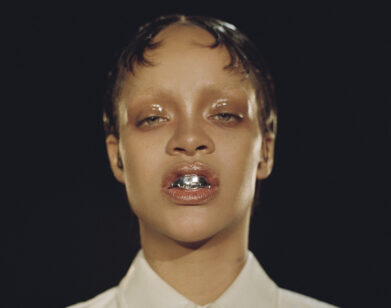Jerome LOL: A Boy on His Own

LOL Boys began when Jerome Potter and Markus Garcia met on a music message board. But nothing lasts forever, and following their greatest success yet—the recently released EP Changes—the duo has decided to take an indefinite hiatus, with Jerome continuing the project under the solo pseudonym Jerome LOL. We spoke to the Cali native about how the band worked, what we can expect from the new project, and the wonders of being online.
Jerome LOL – Happy/Sad by Jerome LOL
ALEX CHAPMAN: How did you guys start out?
JEROME POTTER: It started off via message board and blossomed into something that became real life, essentially. Obviously the web presence is a big part of LOL Boys as a group. We had similar tastes and we ended up speaking online after that and it basically turned into this thing where we were like, “Do you wanna start producing together?” We were both into each other’s work.
CHAPMAN: Did you guys start with original content?
POTTER: It started with remixes and grew from there. It was more just about being fans of each other’s tastes. I think the project began—since it was not based on real-life friendship—it was an experiment to see what we could do with something born on the Internet and something with an audience on the Internet.
CHAPMAN: When did you guys first meet in person?
POTTER: It was the winter of 2008, I’d say, and I visited Markus in Chicago, basically to work on tracks and see how the process worked. But we ended up just listening to a bunch of music and not having a proper studio, so we just went back to the old way we had been working.
CHAPMAN: Was it weird meeting someone you knew things about through conversation but had never actually seen face-to-face?
POTTER: If anybody’s met anybody from the Internet, there’s always this first reaction. An Internet persona doesn’t necessarily reflect a person’s live persona, so there’s always a bit of adjustment in getting used to somebody that you’ve had some sort of relationship with online. I think it’s more of a common thing in today’s world to meet somebody on the Internet from the other side of the world and someday you fly to that place and meet them [in person]. It’s something I’ve gotten used to in the music industry now, which is so based online—you go to Europe and you meet somebody you’ve been speaking with for a long time.
CHAPMAN: You guys never worked in an actual studio together—how did that inform the creative process? Were you guys still able to form ideas together, or did things have more of a back-and-forth nature?
POTTER: It was a conversation. When we first started it was more of a surprise factor, but as it matured in process, the whole thing kinda developed a vision naturally. There were discussions of how, aesthetically, the music should be and it kinda fits a certain style as of [Changes], definitely. But initially, the surprise factor was fun. Doing a pure collaboration of an art form—if you’re a painter and you give your canvas to somebody else to paint over, you never really know what’s gonna come back.
CHAPMAN: The song “Changes” is a standout on the EP. How did it come together?
POTTER: We decided [Heart Streets] should send some tracks over and vocal stems over and we could make a track out of that. The song kinda happened organically and fit our direction. We’ve always been influenced by pop as a whole—obviously dance music is a large influence in how the songs are formatted, but pop music is at the core of the entire project, and it seemed like a great opportunity for the project to do a proper pop song.
CHAPMAN: And the video seems to sync up perfectly with the feel of the song and the project as a whole, being that it’s so tech-savvy. How did that come to be?
POTTER: Watching so many people lip-syncing and doing covers on YouTube, it’s such a big thing, and I thought it’d be funny to do that for the official video. I wrote a long list of people out of my e-mail contacts and sent them the concept, the song and the lyrics, and the response was pretty great—I thought I’d have to push a lot harder to get people to respond. So then from there, I was like “Okay, I have all these great videos of people doing amazing things. How do I make this feel like a real music video?” And then came the idea of making it within the framework of a desktop computer and having a person’s background, having Photo Booth open. I was trying to pay attention to small details. It makes sense to kinda go meta and make videos referencing the computer.
CHAPMAN: The whole project was enveloped in the Internet, and, not so coincidentally, so are many others. What do you think it is about this generation that has them really taking advantage of online life?
POTTER: With people of our generation, we’ve grown up seeing the evolution of the Internet as we’ve evolved. When we were little kids, we knew the Internet was at its infancy, but now you see where it is, and we’ve become adults. I think the Internet is such an integral part of our generation, so it makes sense to embrace the Internet and not shy away from it—it’s an amazing tool. Children today, they were born when the Internet already had a social aspect, where the older generation grew up with no Internet at all. There was fax and paper mail, but we’ve gotten to see the evolution, and we’re lucky to be that generation to have grown up with it—we don’t have to learn it, but we aren’t just born with it. It’s evolved as we’ve evolved. I think that’s an important part of the whole vision of the group.
CHAPMAN: And an important part of reaching out—with all these sites that host music and act as social media, it’s pretty easy to get in contact with people.
POTTER: With Soundcloud and Facebook and Twitter, when you’re a fan of someone’s work, it’s easy to create a dialogue with other artists. We’d known Star Slinger off the Internet and then I met him at South By Southwest and I was like, “Oh cool, it’s great to meet you,” and then he brought us on tour in the Midwest. So definitely things come out of these Internet relationships—it happens for everybody, and there’s no real way to avoid it unless you refuse to be on the Internet, which some artists do, but I think it’s cool to create a dialogue with artists.
CHAPMAN: So now you’re doing your own thing and LOL Boys is on a break. How’d you guys come to that decision?
POTTER: LOL Boys started four years ago, and it’s basically been an experiment to see how far we could take it in the public and make it an actual thing. With the last EP, we kinda reached our goal—having amazing support, having physical vinyl, and making the record we wanted to make. Doing something on the Internet with the time zones being bi-coastal was a very difficult process. We have kinda reached the peak and are going on hiatus for now and working on solo projects.
CHAPMAN: You’ve already released “Happy/Sad,” which is amazing. What’s the main difference in working on your own?
POTTER: Collaborating with someone, you’re half of a greater whole—regardless of how much work is put in by either party, you have something to lean onto. When you’re solo, it’s more like, “This is me—this is me doing me.” There’s no one saying, “Oh yeah, that’s really good.” It’s you going, “Okay, I love this, I wanna put it out,” or, “This is not good.” It’s definitely a different mindset of making music, but I’m going to continue working under the name Jerome LOL, kinda maintaining a similar aesthetic visually and musically.
FOR MORE FROM JEROME LOL, VISIT HIS SOUNDCLOUD.






